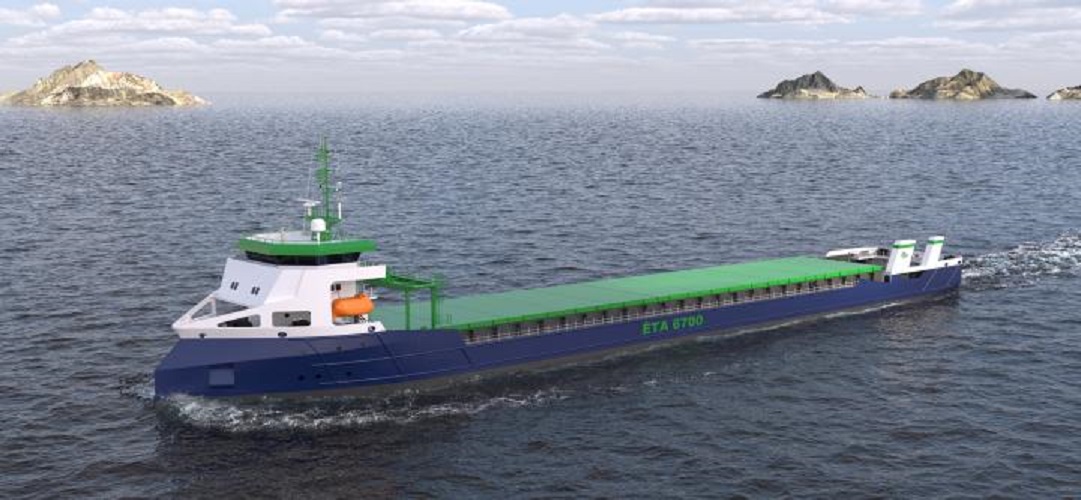Global energy and commodity group, Mercuria and maritime innovator, ÈTA Shipping announced a landmark partnership to accelerate the transition to sustainable short-sea shipping. A joint venture will see the construction of six initial (and ten optional) vessels designed for maximum efficiency, with construction undertaken by Taizhou Sanfu Ship Engineering Co., Ltd

These state-of-the-art vessels will be owned by Mare Balticum BV, a subsidiary of Mercuria, with ÈTA Shipping acting as a minority shareholder. The maiden voyage of the first vessel is planned for the second quarter of 2025
Zero emission
ÈTA Shipping was established to fundamentally rethink the way that cargo ships are designed and built. This to radically improve both their efficiency and the way they operate. The modular design of the ÈTA 6700 vessel means that there is no main engine, instead, an electric motor powers the propeller. Electricity is supplied by generators which can be fuelled by conventional or low carbon fuels. It is also possible to connect any sustainable power source, such as batteries or fuel- cell technology that can run for example on green Hydrogen, Methanol or Ammonia. Zero emission solutions can be added or replace the originally installed generators.
Founded by Sam Gombra and Walter van Gruijthuijsen the name ÈTA Shipping comes from the Greek letter η (ÈTA), the symbol used for efficiency, which was the key concept in the vessel design.
Modular approach
“The modular design of the vessels allows for an easy replacement of a power source, which can be anything as long as it produces electricity”, explains co-founder Sam Gombra. “We estimate that it will take less than a day to remove the existing power generation system and replace it, fully or partially, without the need for a shipyard.
The ÈTA 6700’s efficient design has been achieved without compromising speed or cargo carrying capacity, and at a comparable new build cost versus conventional vessels. It has a cargo carrying capacity of 7400 ton deadweight but is just under 5000 gross tonnage and can achieve 10.5 knots fully laden at under 900 KW of power. This makes it the most efficient Ice 1A vessel in its peer group.
Autonomous
Automation also plays a big part in the efficiency gains and safer maritime operations when compared to traditional vessels. As a result, the ship can be safely managed with a reduced crew size of four, instead of six.
“The vessel’s 3D management tool that uses over 1,300 sensors, enables virtual navigation, equipment data access, and historical trend analysis for crew and technical staff.” noted Walter van Gruijthuijsen, a seasoned naval architect and co-founder of ÈTA Shipping.
Energy Transition
The investment in ÈTA Shipping and the new shipbuilding series of ÈTA 6700 vessels gives Mercuria a platform to accelerate the transition to zero carbon shipping and is consistent with their energy transition agenda.
“Three features make these vessels truly unique: future-proof design, efficiency, and automation. Designed with the efficiency in mind, ÈTA vessels are already 30% more efficient than a conventional newbuild and about 50% more efficient than the average ship in the legacy fleet.” said Mindaugas Gogelis, Energy Transition Director of Mercuria.
At a time when there is a high degree of uncertainty about the future cost and availability of zero-carbon maritime fuels, it is imperative to maintain the flexibility of choice of future technology.
“The embedded flexibility in ÈTA 6700 design will allow us to offer a tailored decarbonisation pathway optimized to the specific needs of cargo owner or operator,” noted Larry Johnson, Global Head of Freight and Shipping Trading of Mercuria. “We can go as fast as technical solutions become commercially available.”
Both Mercuria and ÈTA Shipping are committed to leading the transition to greener and more efficient shipping. Working with other stakeholders, the partners aim to expand the fleet and make a lasting impact on the maritime industry.